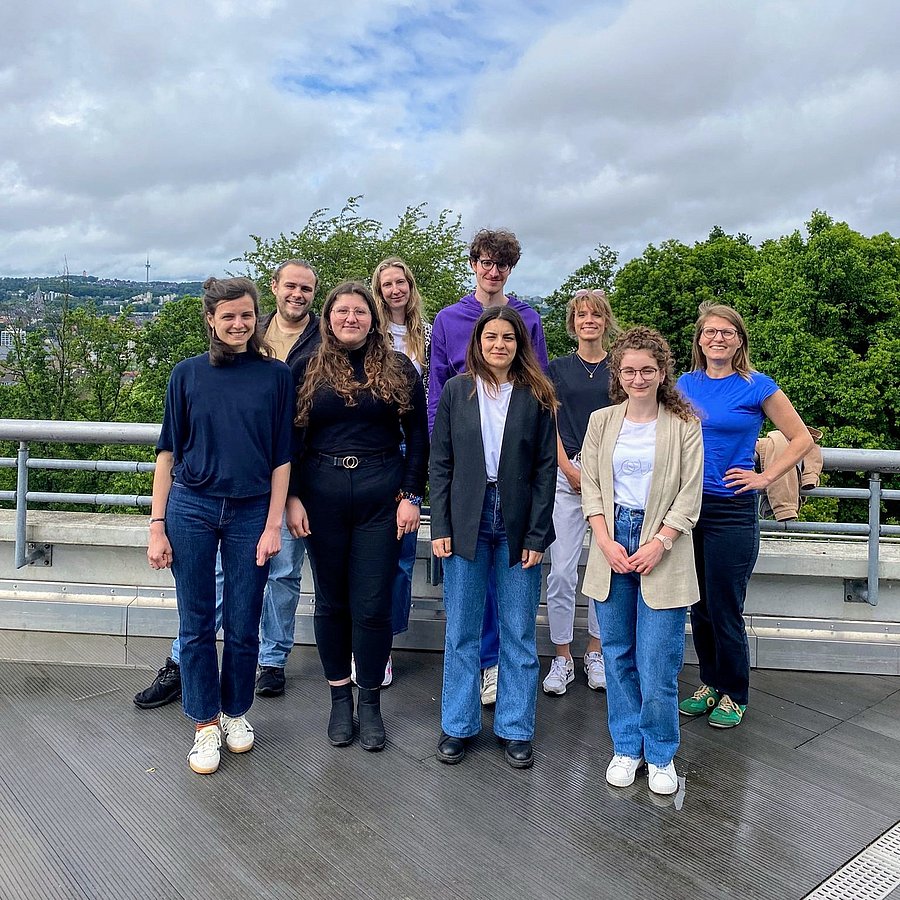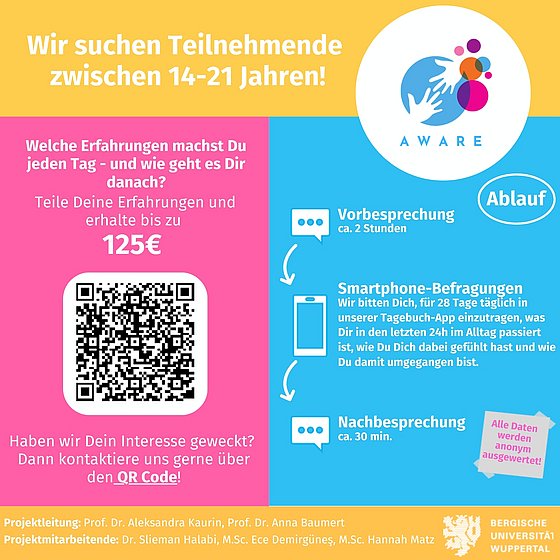AWARE study: The impact of daily racial discrimination on youth mental health

PI: Aleksandra Kaurin, Anna Baumert, Slieman Halabi
Project Duration: 2023-2025
Funding: Heidehof Foundation, Federal Anti-Discrimination Agency

AWARE study team, f.l.t.r.: Lukas Braun, Cara Wicher, Prof. Dr. Aleksandra Kaurin, Nicolas Mejeritski, Julia Riuzki, Hannah Matz, Ece Aleyna Demirgüneş, Prof. Dr. Anna Baumert, Lindita Zeqa

In the weeks following the murder of George Floyd, media coverage of the murder of Ahmaud Arbery, and the killing of Breonna Taylor, worldwide of protests by the Black Lives Matter movement surged. Calls to dismantle racist structures went far beyond acts of police violence and addressed disparities in diverse aspects of life (Zajak et al., 2021). The movement quickly internationalized, first sparking solidarity protests, then inspiring adaptations of frames and demands to other, mostly Western, societies. Curtailing implicit structural racism is an important societal development also from a clinical psychological perspective, as numerous studies indicate that ethnic minority children and adolescents are at a particularly high long-term risk of developing a mental health disorder (Dingoyan et al., 2017; Pachter et al., 2009). Conceivably, youth belonging to ethnic minority groups are more often confronted with racial violence and discrimination (e.g., devaluations, unequal treatment) in their everyday lives (Pascoe & Smart Richman, 2009), which accumulate into vulnerability to mental disorders (Benner et al., 2018). At the same time, however, experiences of discrimination and associated daily stress processes in the lives of children and adolescents who were born in Germany as children of migrants or refugees, or who fled to Germany as children themselves, have not been sufficiently studied (von Lersner et al., 2015).
Very little is known about adolescents and young adults with so-called "hybrid identities," meaning those who do not clearly identify as People of Color (PoC) or White, or those who are clearly perceived as White (BAfF, 2020, p. 26 f.). Also, migrants from (south) Eastern European neighboring countries in Germany are subject to prejudices and resentments (e.g., refugees from the genocide in former Yugoslavia, immigrants from the Soviet Union and the countries of the Warsaw Pact, refugees from Ukraine). Hans-Christian Petersen points out in a recent study that by reducing racism to skin color, "all those victims of racism whose social positioning does not conform to this dichotomy are excluded. The most significant example of this is people from Eastern Europe, who make up almost half of all people with a migration background living in Germany" (Petersen, 2022), and their experiences of discrimination are still largely unexplored (Othmann, 2022).
Although adolescence alone represents a developmental phase of increased vulnerability to mental disorders, the few existing, mostly qualitative studies from Germany focus primarily on the consequences of the migration process and cultural experiences of difference in health care experienced by adult migrants (Yeboah, 2017). The aim of the project is to systematically investigate discriminatory and racist experiences in the everyday lives of children and adolescents. Our goal is to characterize the specifics of the stress and coping experiences of affected youth, which may plausibly account for the development of mental disorders. Such so-called intensive longitudinal data collection is an important key to our understanding of long-term accumulation processes of the stress experience of affected individuals because the experiences captured are precisely those that are of central importance to participating adolescents. In the long term, this empirical data basis will lay the foundation for discussing the significance of necessary racism-sensitive transformations in the care structures for children and adolescents. This, in turn, will help develop and test measures for more adequate psychotherapeutic care for affected persons in Germany (and beyond).
Collaborator: Ursula Moffitt, Wheaton College Massachusetts

References:
BAfF e. V. (2020). »Wir müssen reden«. Rassismus thematisieren in mehrheitlich weißen Beratungs- und Therapiestrukturen im Kontext Flucht. Berlin: BAfF e. V. Verfügbar unter: https://www.baff-zentren.org/ aktuelles/wir-muessen-reden-rassismusthematisieren/ [17. 06. 2022].
Benner, A. D., Wang, Y., Shen, Y., Boyle, A. E., Polk, R., & Cheng, Y. P. (2018). Racial/ethnic discrimination and well-being during adolescence: A meta-analytic review. American Psychologist, 73(7), 855.
Dingoyan, D., Schulz, H., Kluge, U., Penka, S., Vardar, A., von Wolff, A., Strehle, J., Wittchen, H. U., Koch, U., Heinz, A. & Mösko, M. (2017). Lifetime prevalence of mental disorders among first and second generation individuals with Turkish migration backgrounds in Germany. BMC Psychiatry, 17(1). https://doi.org/10.1186/s12888-017-1333-z
Othmann, Ronya (2022): Die blinden Flecken antirassistischer Diskurse. In: Bundeszentrale für politische Bildung, 27.04.2022, https://www.bpb.de/themen/migration-integration/kurzdossiers/507449/die-blinden-flecken-antirassistischer-diskurse/
Pachter, L. M. & Coll, C. G. (2009). Racism and Child Health: A Review of the Literature and Future Directions. Journal of Developmental Behavioral Pediatrics, 30(3), 255–263.
Pascoe, E. A. & Smart Richman, L. (2009). Perceived discrimination and health: A meta-analytic review. Psychological Bulletin, 135(4), 531–554. https://doi.org/10.1037/a0016059
Petersen, Hans-Christian (2022): Antiosteuropäischer und antislawischer Rassismus. In: Veronika Kiesche: Jüdische (Un-)Sichtbarkeiten. Verhandlungen von Antisemitismus und anti-slawischem Rassismus in der zweiten Generation jüdischer Kontingentflüchtlinge, https://minor-kontor.de/wp-content/uploads/2022/12/Minor_WorkingpaperVII.pdf, S.9
von Lersner, U., Pleger, M., Baschin, K., Morina, N. & Fydrich, T. (2015). Psychische Belastung von Jugendlichen. Zeitschrift für Klinische Psychologie und Psychotherapie, 44(3), 147–158. doi.org/10.1026/1616-3443/a000306
Yeboah, A. (2017). Rassismus und psychische Gesundheit in Deutschland. In: Fereidooni, K., El, M. (eds) Rassismuskritik und Widerstandsformen. Springer VS. https://doi.org/10.1007/978-3-658-14721-1_9
Zajak, S., Sommer, M. & Steinhilper, E. (2021). Black Lives Matter in Europa – Antirassistischer Protest in Deutschland, Italien, Dänemark und Polen im Vergleich. Forschungsjournal Soziale Bewegungen, 34(2), 319–325. doi.org/10.1515/fjsb-2021-0028
Last modified: 26.09.2024
